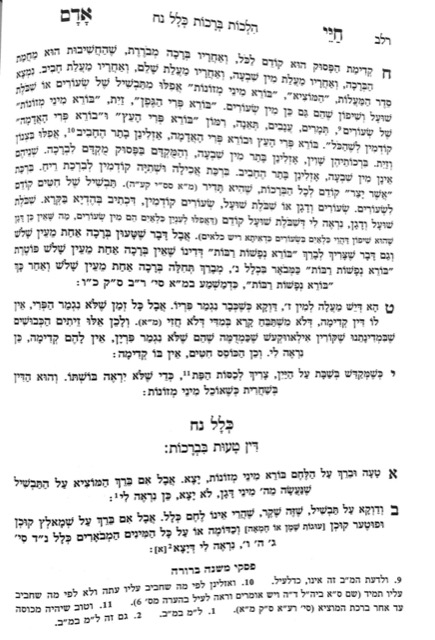We are beginning siman 9. The Chayei Adam writes that the advantage of shivas haminim only applies when the fruits are fully ripe, because the Torah’s praise of Eretz Yisroel through these fruits applies specifically when they are fully grown.
The Chayei Adam writes of an example prevalent to his time in which pickled olives were made from immature olives. It appears that nowadays, pickled olives are made from fully grown olives, so they receive the advantage of being shivas haminim.
The Chayei Adam also writes about wheat kernels. The Torah gives chashivus to wheat because of the many items which can be made from it, but the kernels in their raw form are not included in that which Eretz Yisroel is praised.
This point about shivas haminim in their non-optimal state is a machlokes. The Magen Avraham holds they still have the advantages of shivas haminim, and the Gra and Chayei Adam hold they do not. The Mishnah Berurah is not clear, as every time he mentions this halacha he brings down both opinions
In siman 10, the Chayei Adam discusses kiddush. If we were to follow the seder brachos, it would be incorrect to say hagefen before hamotzi. However, Chazal instituted that kiddush should be recited over wine, because the preferred method of saying praise to Hashem is with wine. In order to avoid the issue of seder brachos, the Chayei Adam writes that one should cover the bread in order for it to avoid the “embarrassment” of being passed over for the wine.
The Chayei Adam adds that, based on this argument, if one makes kiddush on Shabbos morning on mezonos products, the mezonos should be covered during the recitation of the kiddush. The Kitzur Shulchan Aruch mentions this halacha as well.
The Mishnah Berurah does not mention the need to cover mezonos. It could be that he holds the order in which Chazal instituted making kiddush is akin to the halacha that one is not obligated to change their planned order of consumption just to follow seder brachos (see shiur 1120), so this reason alone will never necessitate covering the bread/mezonos. The reason bread specifically is covered could be for other reasons, such as a remembrance of the man which fell in the desert. This would explain why the Mishnah Berurah holds that one should keep the bread covered through the end of the bracha of hamotzi, because if the point was just to maintain the seder brachos, one could uncover it already after kiddush.
The Kitzur Shulchan Aruch holds that one should preferably have two pieces of mezonos when making kiddush.
Summary
-
There is a machlokes whether eating shivas haminim in their non-optimal state receive the advantage of shivas haminim regarding seder brachos.
-
The Chayei Adam holds that seder brachos requires one to cover the bread for kiddush, and, by extension, to cover mezonos as well. Others hold that the reason for covering the bread has nothing to do with seder brachos, and is therefore limited to bread and not extended to mezonos.
-
Practically, one should strive to fulfil the opinion of the Chayei Adam and cover mezonos products as well.
-



